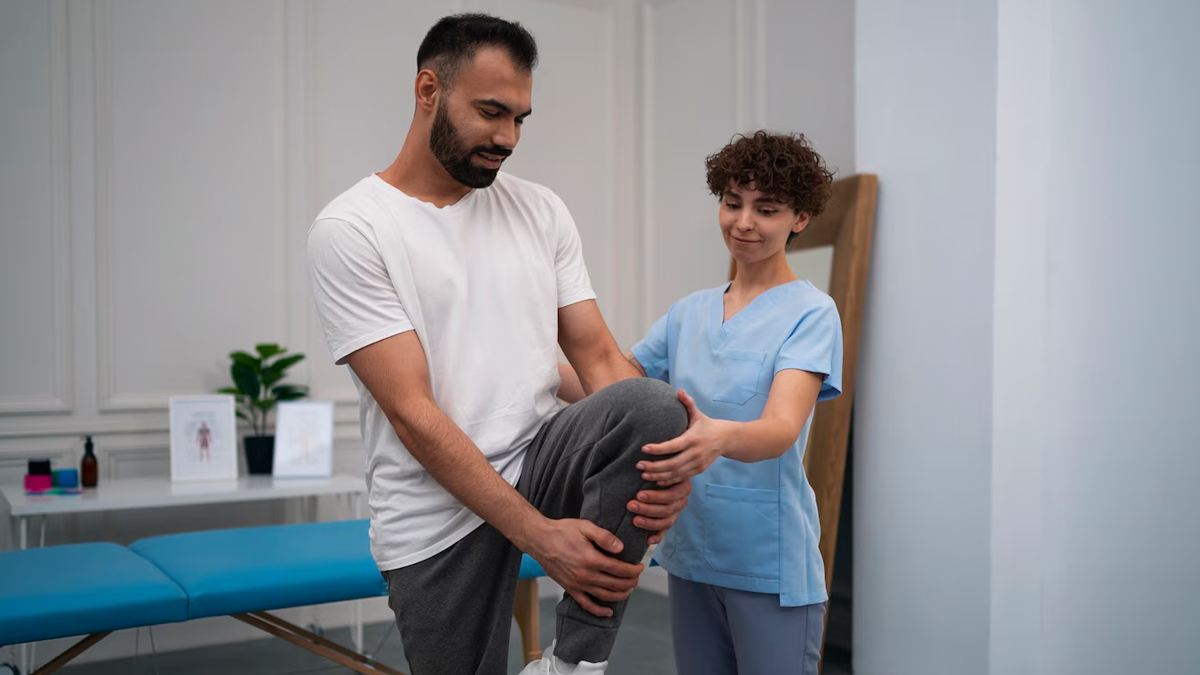
As we age, our bodies undergo physical changes while also facing external challenges like work stress, poor ergonomics, and posture issues, all of which contribute to musculoskeletal problems.
Table of Content:-
Musculoskeletal problems, or musculoskeletal disorders, are conditions that affect the body's musculoskeletal system, which include the bones, joints, muscles, ligaments, tendons, and nerves, causing pain, stiffness, and potentially limited movement.
This is when physiotherapy can prove beneficial. If you're in your 30s and 40s, and are developing bone, joint, and muscle issues, you can resort to physiotherapy every once in a while. Read to know more about the benefits and what an expert has to say about the same.
Also Read: Chef Ranveer Brar Opens Up About Recent Cervical Spine Injury; Know All About His Diagnosis
Role Of Physiotherapy After 30s

Physiotherapy, also known as physical therapy, is a healthcare discipline that focuses on improving patients' physical wellbeing by restoring function, addressing injuries or disabilities through movement, exercise, and manual therapy.
In an interaction with the OnlyMyHealth team, Dr Shreyas Katharani, HOD – Physiotherapy, Jaslok Hospital, Mumbai, says, "As we age, our body goes through wear and tear on certain joints. People above 30 years may come across a domain of musculoskeletal problems due to work, poor posture or even from previous injuries. Women above 30 years start experiencing conditions like fibromyalgia, arthritis or even osteoporosis. With age, flexibility and mobility reduces.” This is when physiotherapy can aid towards improving functional needs of the body and overall quality of life.
A 2024 study published in the Frontiers Public Health journal looked at how physiotherapy helps older adults and how session frequency and duration affect results. It included 384 seniors with conditions like arthritis, hypertension, osteoporosis, COPD, and diabetes. It was found that physiotherapy reduced pain, improved mobility, and increased independence in patients. More sessions led to better pain relief, while longer sessions had an even greater impact on pain and mobility.
How Often Should You Go For Physiotherapy In Your 30s And 40s?

Physiotherapy promotes a pain-free, active, and functional lifestyle, and experts recommend doing physiotherapy at least twice a week to maintain flexibility, strength, and joint health.
"Studies indicate that individuals experiencing musculoskeletal issues earlier in life may face a shorter lifespan due to increased physical inactivity, higher susceptibility to falls, and associated conditions like cardiovascular disease and metabolic disorders," Dr Salome Sequeira, MS. Exercise Physiology, Corrective Exercise Specialist, Physiotherapist, Jaslok Hospital, Mumbai, tells the OnlyMyHealth team.
He adds that age-related joint and muscle changes are increasingly observed in younger adults due to sedentary lifestyles, poor posture, obesity, and lack of physical activity. Conditions such as early-onset osteoarthritis, chronic back pain, and muscle deterioration are becoming more prevalent in individuals in their 30s and 40s.
Early physiotherapy can slow these changes and support long-term health, notes Dr Sequeira.
Also Read: How To Manage Pregnancy-Related Back Pain Through Physiotherapy
Signs You Might Need Physiotherapy

It is important to note that physiotherapy is not just for injury recovery; it’s a proactive approach to maintaining movement, preventing pain, and supporting long-term health. So, you may benefit from physiotherapy if you experience:
- Poor posture
- Restricted range of motion
- Persistent joint pain
- Increased stiffness or reduced mobility
- Balance and coordination issues
- Weak bone health
- Chronic conditions like diabetes, hypertension, or heart disease
Conclusion
Whether you are a 30 year old who has constant back pain or a person in their 40s coping with consistent joint issues, physiotherapy can be highly beneficial. In general, regular physiotherapy sessions in your 30s and 40s can benefit not just your musculoskeletal system, but also prevent chronic joint conditions like arthritis and osteoporosis in the future. If you want to start physical therapy, it is best to consult a specialist or a doctor who can guide you about the same.
Also watch this video
How we keep this article up to date:
We work with experts and keep a close eye on the latest in health and wellness. Whenever there is a new research or helpful information, we update our articles with accurate and useful advice.
Current Version